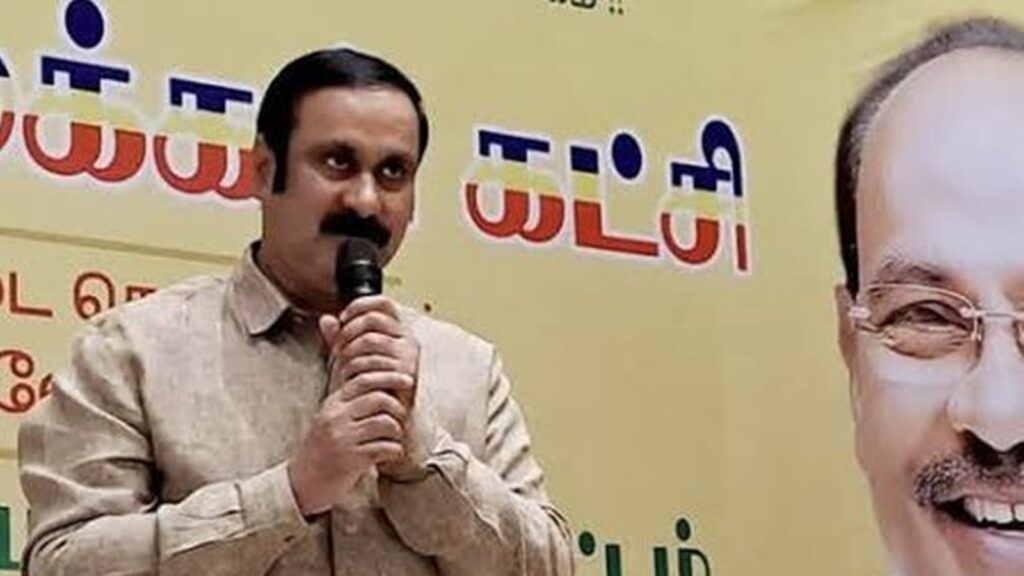Pattali Makkal Katchi (PMK) founder S Ramadoss expelled his son Anbumani Ramadoss from the party’s primary membership Thursday, and stripped him of all posts, citing “unprecedented anti-party activities” and calling him a “weed” – with months of back-channel diplomacy, emotional appeals, and third-party mediation involving BJP leaders, RSS functionaries, and even the Chancellor of Vellore Institute of Technology, failing to resolve the family feud.
The dramatic announcement came after a high-level administrative council meeting chaired by Ramadoss Senior at his farmhouse in Thailapuram, south of Chennai. At a press conference immediately after, Ramadoss said Anbumani was not being removed just as the PMK working president but being expelled from the party entirely.
“The weed called Anbumani has been removed from the PMK,” he said.
Ramadoss said Anbumani had been served with a show-cause notice outlining 16 specific charges, but had failed to respond either in writing or in person. “The committee sent notices on September 19 and twice thereafter. However, Anbumani neither responded nor provided any explanation. This constitutes an admission that the charges are true,” the PMK chief said, asserting that the party had followed its disciplinary norms in letter and spirit.
The timing of Anbumani’s ouster carries significant political ramifications beyond the party. Though weakened in recent years, the PMK is still one of the few caste-based parties in Tamil Nadu with a substantial vote bank and an organised cadre, particularly among the Vanniyars in northern districts. Its formal split now leaves the BJP-led NDA in the state with only the AIADMK as a mass-based ally.
The remaining parties in the NDA stable – Tamil Maanila Congress (led by G K Vasan), Indhiya Jananayaga Katchi (run by the SRM Group), and the New Justice Party (headed by A C Shanmugam) – offer little in terms of grassroots strength.
Meanwhile, Puthiya Thamizhagam, once part of the NDA, has joined actor Vijay’s political front, further eroding the alliance’s breadth.
While the BJP continues to maintain that it will lead a strong front in the 2026 Assembly polls, the PMK’s implosion has exposed the fragility of that claim. The PMK split will also hurt the NDA’s hopes of consolidating OBC votes, with the Vanniyars the largest OBC group in the state.
The charges against Anbumani, according to party insiders, included unauthorised political actions, attempts to run a parallel party structure, defiance of party leadership, and, notably, the alleged planting of a surveillance device on Ramadoss Senior’s chair – an issue under police investigation.
Ramadoss mentioned the same Thursday, saying: “Even devices were planted to snoop on me… Let him (Anbumani) start his own party now. This party was started by me, and no one – including my son – has the right to hijack it.”
Visibly emotional, Ramadoss added that the decision was not sudden, but something he had been warning about for three years. “I’ve raised Anbumani, I trusted him, and gave him opportunities to grow in the party. But his actions have caused serious damage… He does not possess the qualifications to be a politician. His actions have caused distress to party functionaries and cadres.”
Incidentally, Ramadoss offered to take back party leaders who had sided with Anbumani. “My own political children, whom I groomed, joined hands with him and tried to run a separate faction. I am sad about them, but I am willing to forgive them.”
He warned PMK leaders not to maintain any contact with Anbumani, warning of disciplinary action.
The rift between the Ramadoss duo has been simmering for nearly a year. It first came into the open in December 2024 when Ramadoss appointed his grandson P Mukundan – the son of his daughter Gandhimathi – as the PMK youth wing president.
Anbumani publicly opposed the move, questioning how someone who had joined the party just four months earlier could be given such a key role. Ramadoss then demoted Anbumani from the post of president to working president and reclaimed control himself.
Anbumani, in turn, insisted that only the PMK general council had the authority to remove him and continued to assert his leadership through statewide mobilisation drives, including the recently launched 100-day ‘Rights Retrieval Yatra’.
In July, when a high-end surveillance device was found underneath a chair used by Ramadoss at his Thailapuram farmhouse, the crisis deepened. The PMK founder filed a cybercrime complaint and warned that the party’s integrity was under attack.
Among those who tried to mediate in the row were PMK allies including the BJP and RSS ideologue S Gurumurthy. Later, the Chancellor of VIT University, G Viswanathan – a long-time friend of the family – stepped in at the request of Anbumani’s father-in-law.
At one point, insiders believed a truce was imminent. “The focus is not on ego or succession. It’s on protecting the family and the party from irreparable damage,” a PMK source had told The Indian Express in mid-July.
But those talks fizzled, especially after Anbumani launched his padyatra despite opposition from his father, who petitioned the police to stop the march, calling it a “law and order threat”. The Tamil Nadu Police subsequently denied permission, further isolating Anbumani within the party structure.
On Thursday, Ramadoss asserted that the split was “not a setback for the PMK”. “In farming, we don’t abandon the field because of weeds. We remove them and continue. That’s what has happened here.”
While Anbumani was not available for comments, his next move will likely shape the future of Vanniyar politics in Tamil Nadu. Whether he will launch a new party or challenge his expulsion in court remains to be seen.

